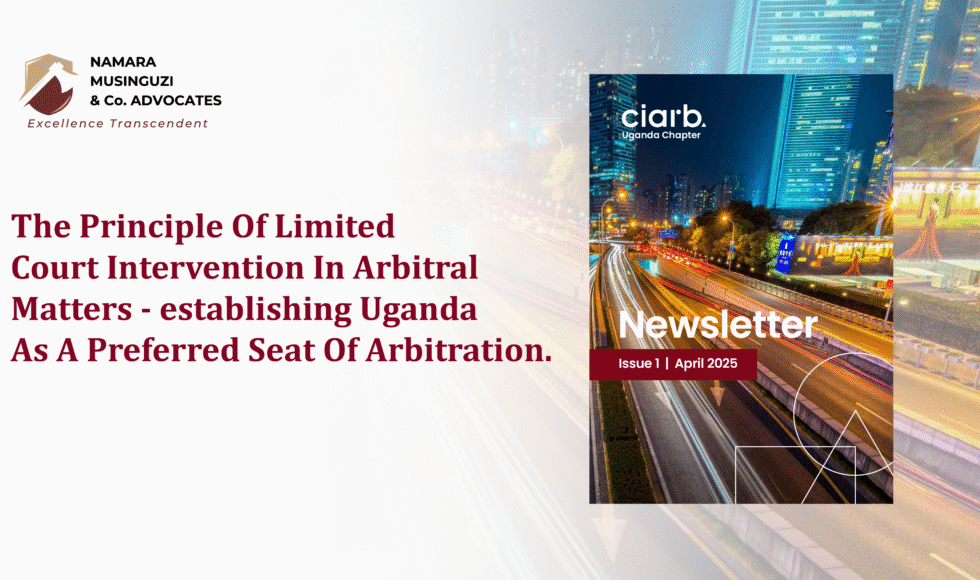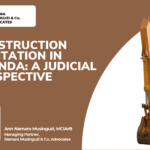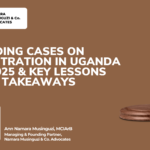Originally published in CIARB UGANDA QI NEWSLETTER 2025 in April, 2025. Reposted here with permission from the publisher.
Introduction
Arbitration, as a preferred form of Alternative Dispute Resolution, has slowly gained traction in Uganda over the years. It is preferred especially because it is dependent on the agreement of the parties, i.e. Party Autonomy. In simple terms, the parties agree upon the entire Arbitration Procedure, end to end.
The first step in this Arbitration Procedure is drafting the Arbitration Agreement. The parties agree on the key tenets, which are the finality of arbitration, the number of arbitrators, the mode of appointment of arbitrators, the rules governing the arbitration, the seat of the arbitration, and the venue of the arbitration.1 In instances where the Arbitration Agreement is silent on any of the key facets, the parties can nevertheless agree on them; in some instances with the guidance of the Arbitrator(s).
Legislation worldwide has recognized the principle of Party Autonomy, limiting the Court’s intervention to only matters as prescribed by law.2Section 9 of the Arbitration & Conciliation Act Cap 5 Such prescribed matters include summoning witnesses, taking down evidence, ruling on arbitrators’ jurisdiction after the arbitrator has decided on their jurisdiction based on the principle of competence-competence, setting aside awards, enforcing, and recognizing awards.
This limited intervention is necessary because parties who choose to arbitrate their disputes intend to agree on the procedure for conducting the same, which in turn saves time and costs that would otherwise have been spent in litigation.
The Limited Intervention further bolsters parties’ confidence in considering Uganda as a safe and preferred seat thus changing the hitherto narrative of Africa as a least preferred seat.
Party Autonomy through the Lens of the Judiciary in Uganda.
In the Supreme Court decision of Mohammed Mohammed Hamid V Roko Construction Ltd3 SCCA No. 014/2015, the Supreme Court upheld the principle of limited court intervention which is premised on upholding Party Autonomy, emphasizing that an application to set aside an Award had to be made to the High Court within the mandatory 30(Thirty) days provided for in the Arbitration & Conciliation Act. 4Section 34(3) of the Arbitration and Conciliation Act Cap 4(As it then was).
The later decision of Babcon Uganda Limited V Mbale Resort Hotel Ltd5SCCA 06/2016. by the same Court clearly emphasized this principle. In agreeing with the Court of Appeal, which relied on the Mr. Justice Harold Platts Commission of Inquiry Report to, among others, interpret Sections 9 and Section 34 of the Arbitration and Conciliation Act Cap 4(as it then was) to dismiss the Appellant’s Appeal, the Supreme Court stated that it was the report which provided the main input for reform of the law relating to arbitration and resulted into the enactment of the Arbitration and Conciliation Act. 6At Page 12 of the Judgment.
The Supreme Court further cited a portion of the report in which the Commission recommended that “there is need to incorporate into our international instruments and introduce radical provisions which will give arbitration the importance it plays in other jurisdictions.” 7Ibid. In this case, the Supreme Court stated that an aggrieved party could only appeal to the High Court pursuant to Section 38 of the Arbitration and Conciliation Act Cap 4, where the parties had so agreed that an appeal would lie on a question of law arising out of the award. Subsection 3 further provided that an Appeal would lie to the Court of Appeal only if the parties agreed that an appeal would lie and the aggrieved party was granted leave by the High Court, failure of which by the Court of Appeal. In the case before it, the parties had not agreed that an Appeal would lie to the High Court, and it, followed that neither the Supreme Court nor the Court of Appeal had the jurisdiction to interfere with the Party Autonomy.
Party Autonomy through the Lens of the Judiciary in Uganda.
The recently decided case of Uganda Muslim Supreme Council v. Babirye Yudaya & 2 Others8Misc. Applic. No. 0548 of 2024 Consolidated with Misc. Applic. Nos. 0541, 549 and 536 of 2024(All arising from HCT-00-CV-C1-0008 of 2023)
was in respect to an application to review and set aside the Judgment of the High Court delivered in Company Cause No. 002 of 2023. The Company Cause had been filed in the High Court by the Respondents who sought orders that the Applicant be wound up in the public interest and in the interest of the Applicant’s members because the manner in which the Applicant conducted its affairs was prejudicial to the Respondents and the Muslim Community. The High Court ruled in favour of the Respondents hence the application for Review by the Applicant. One of the issues as agreed upon by the parties to the application was whether it presented sufficient grounds to justify the review of the Judgment delivered by the Court in Company Cause No. 002 of 2023.
In considering the application, the Honorable Judge considered Article 28(1) and (2) of the Applicant’s Constitution which provided as follows:
“(1)There shall be a UMSC Arbitration and Conciliation Council appointed by the joint session acronymed hereafter as ‘the MAC,’ which shall have jurisdiction to hear all disputes among Muslims and between Muslims and Non-Muslims filed by such non-Muslims relating to any issue, including the running of the affairs, management, interest and rights of the UMSC or its members, contract disputes and interpersonal relationships except electoral matters of the UMSC. (2) All members of the UMSC, save those who will expressed their disclaimer in writing within 30 days of adoption of this amended constitution by the General Assembly shall for all intents and purposes be deemed to have submitted to the jurisdiction of the MAC.”
Court explained that in essence, the Applicant’s Constitution established an arbitral mechanism, the MAC, for resolving disputes including the running & management of the Affairs of the Applicant. The only Jurisdiction that the MAC was not vested with was in respect to the electoral matters of the Applicant. In the premise, relying on Section 9 of the Arbitration & Conciliation Act Cap 4(As it then was), the Court granted the application and held that there was an error apparent on the face of the record that was occasioned by the filing and subsequent determination of a Company Cause in total disregard of the Arbitration Clause contained in the Applicant’s Constitution and which bound the Respondents who were members of the Applicant.
Conclusion
According to the SOAS Arbitration in Africa Survey Report 20249Emilia Onyema: SOAS Arbitration in Africa Survey Report: Perceptions on Africa-Connected Arbitration: Seats, Female Arbitrators & Tribunal Secretaries, in respect to seats of arbitration, the survey on seats of arbitration revealed among other things, that some African seats were unsupportive of arbitration10Ibid, Page 4 and that further, the prevalent reasons for the lack of support of arbitration were undue intervention and delays caused by domestic courts at various stages of the arbitration process.11 Ibid
It therefore follows that Limited Judicial non-intervention in Arbitral Matters is not only vital to recognizing, respecting & preserving Party Autonomy with the ripple effect of creating an efficient Arbitration process but is also critical in promoting Uganda and the continent at large as a safe and preferred seat.
By aligning their decisions with the provisions of the Arbitral Laws and well established principles, Courts demonstrate their commitment to supporting arbitration while fostering trust in Uganda as a safe and preferred seat. As such; Yudaya is a very welcome continued step in the right direction.

Ann Namara Musinguzi; MCIArb
Managing Partner, Namara Musinguzi & Co. Advocates
info@namaralaw.com
© CIARB UGANDA QI NEWSLETTER 2025. All rights reserved. This article appears on this site with permission.
- 1In instances where the Arbitration Agreement is silent on any of the key facets, the parties can nevertheless agree on them; in some instances with the guidance of the Arbitrator(s).
- 2Section 9 of the Arbitration & Conciliation Act Cap 5
- 3SCCA No. 014/2015
- 4Section 34(3) of the Arbitration and Conciliation Act Cap 4(As it then was).
- 5SCCA 06/2016.
- 6At Page 12 of the Judgment.
- 7Ibid.
- 8Misc. Applic. No. 0548 of 2024 Consolidated with Misc. Applic. Nos. 0541, 549 and 536 of 2024(All arising from HCT-00-CV-C1-0008 of 2023)
- 9Emilia Onyema: SOAS Arbitration in Africa Survey Report: Perceptions on Africa-Connected Arbitration: Seats, Female Arbitrators & Tribunal Secretaries
- 10Ibid, Page 4
- 11Ibid



